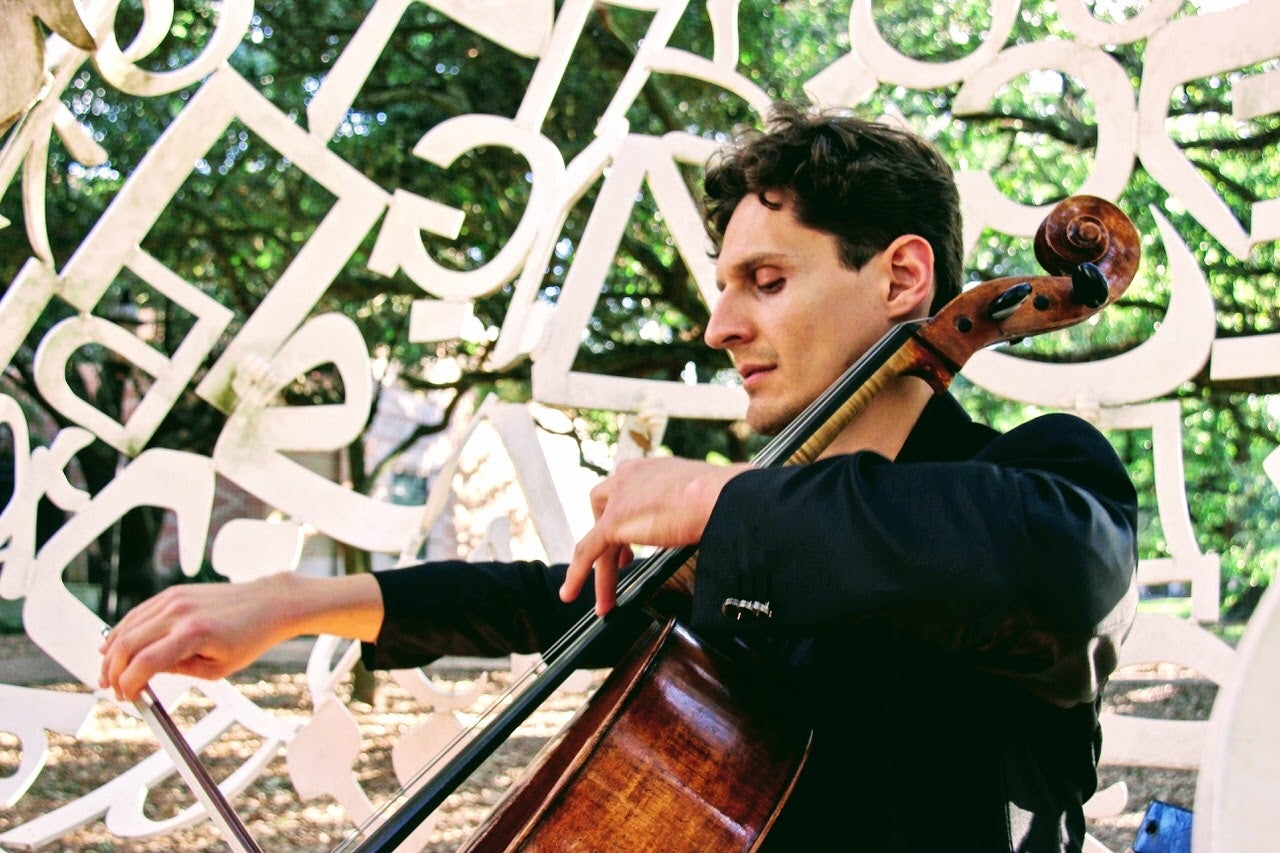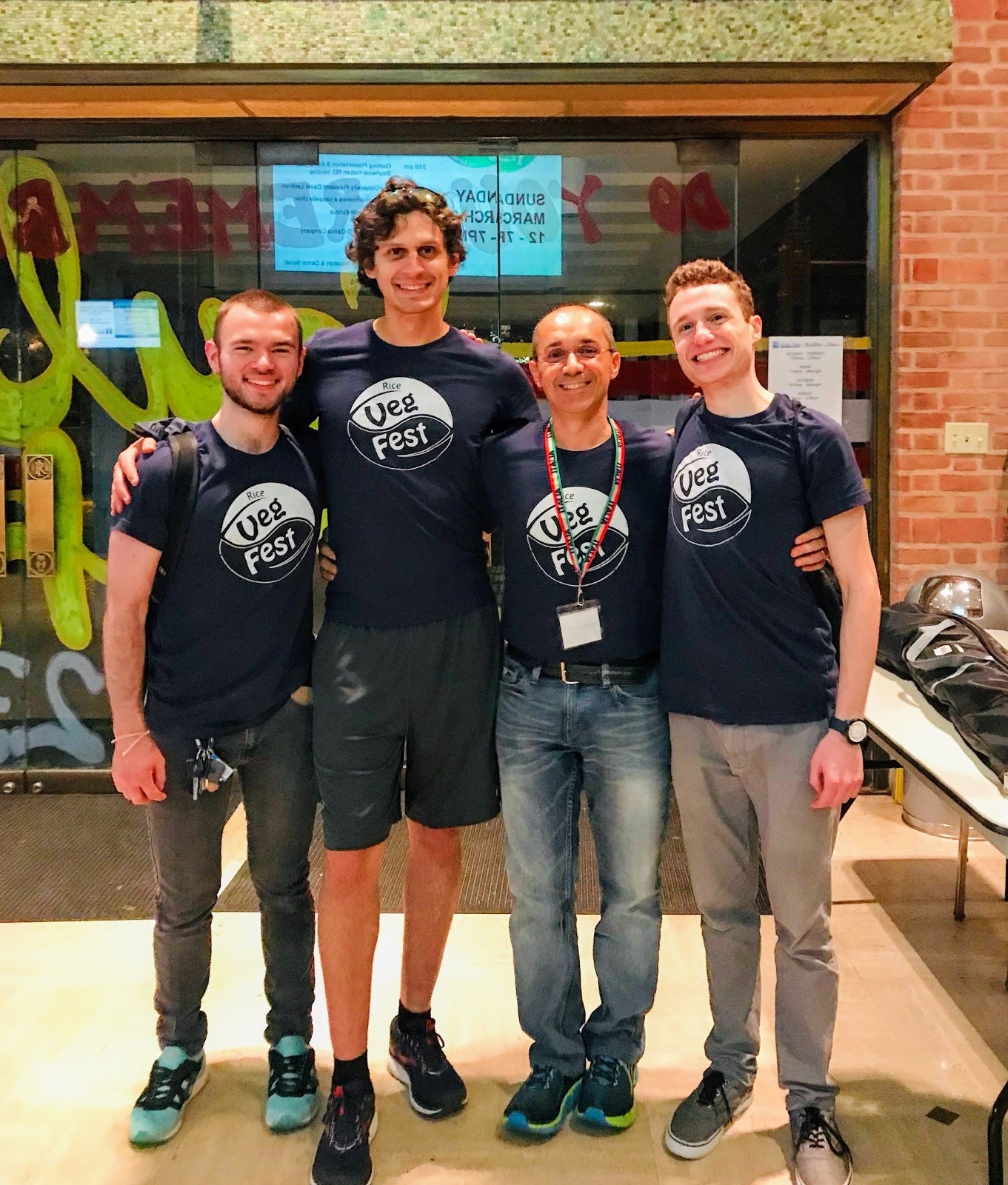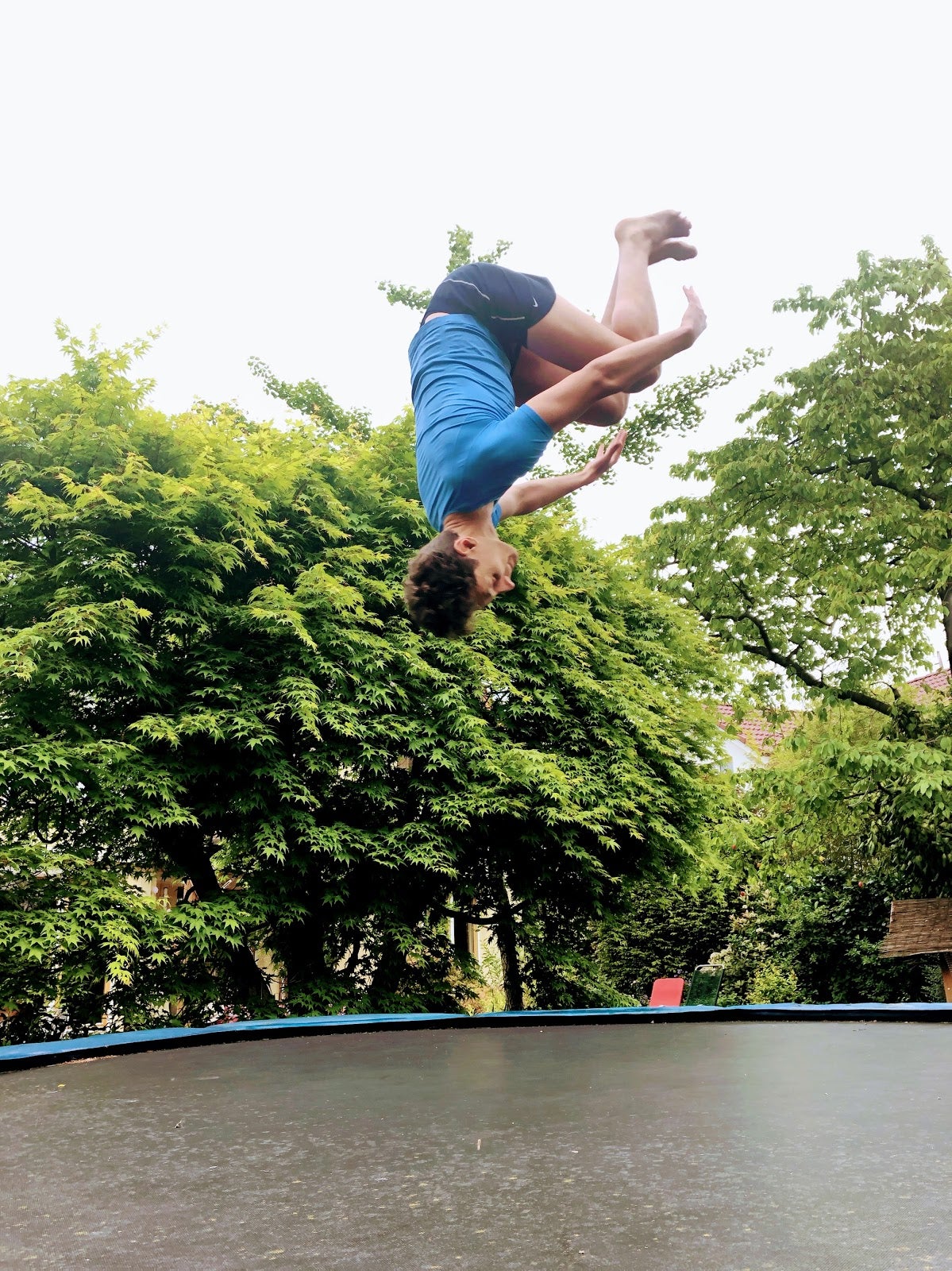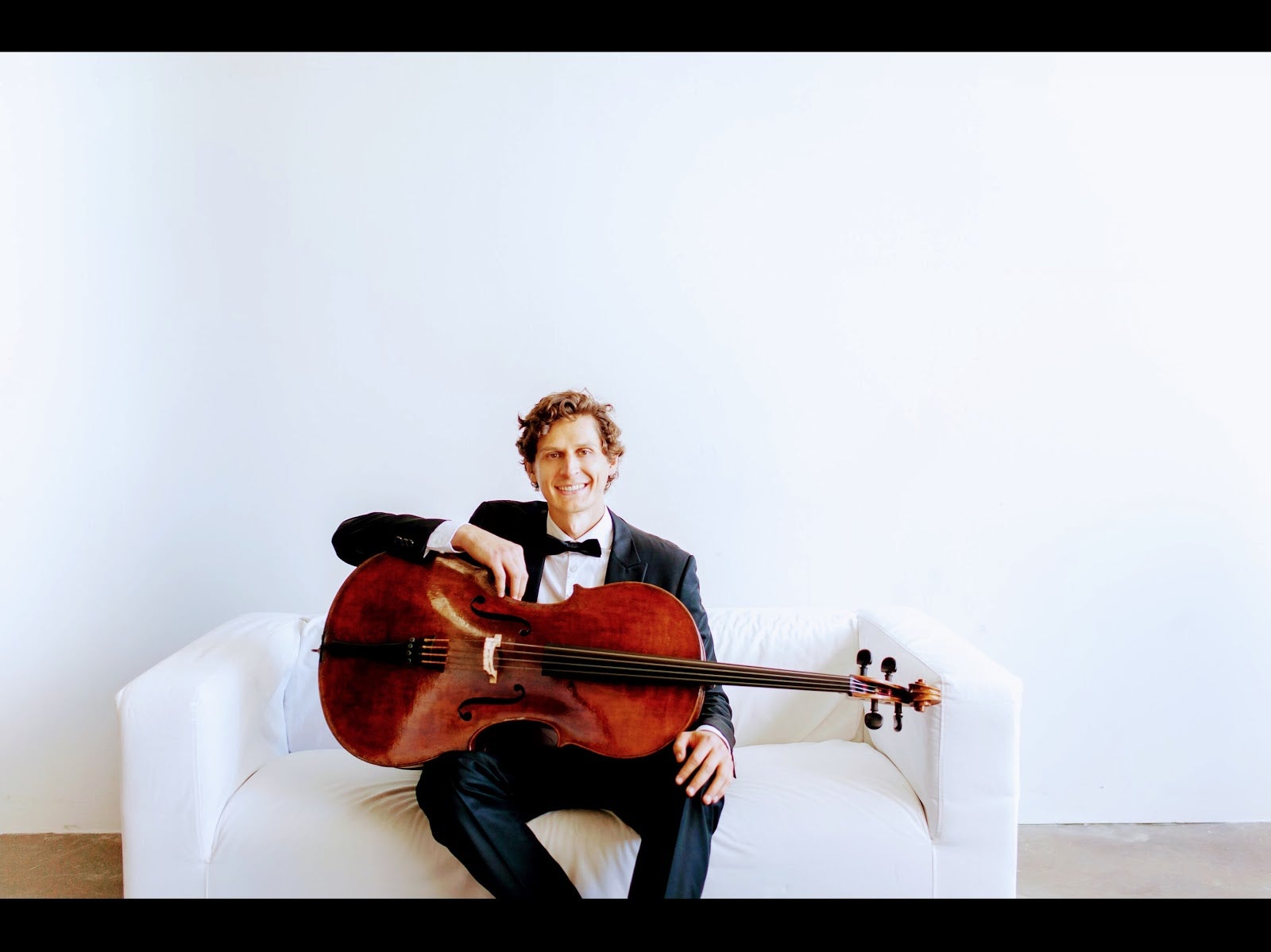Christoph Wagner is a graduate student working on a PhD in Music in Cello Performance. He serves as the President of the Rice Vegan Society, through which he’s led the well-attended Rice VegFest series. We met with Christoph to talk about food, wellness, music, his native Germany, and much more.

Question: How did you first become interested in environmental issues?
Christoph Wagner: I grew up in Germany where environmental issues are much more part of the societal mindset than in the US. In my family, environmentalism has always been very important, and from my childhood on I remember that saving water and energy and being mindful with waste and transportation were strongly implanted in our consciousness. In particular, at my home we were always instructed to switch off lights when not needed, to use little water, to recycle, to be mindful with heating (yes, we were freezing in the winter!) and most importantly to only bike or use public transportation. In fact, as a family of six, we owned one car, and this car was driven on average once or twice per week. Fortunately, in our city in southwest Germany we can do everything by bike, and we have one of the best public transit systems in the world.
My family's dedicated consideration of environmental issues certainly has shaped my interest and concerns. I remember that together with my three older siblings, we walked from house to house to collect signatures against nuclear power. I was a child back then and probably was not able to understand nuclear power in detail. My sister, however, was very convincing and indeed, ended up sending a petition to the minister of environment, who then was, believe it or not: Angela Merkel. While nuclear power is praised by some people as carbon neutral, what about the waste? As long as there is no waste solution, this technology is completely irresponsible for future generations. Germany has been seeking for a waste solution for decades, but has not found a safe storage solution without putting people and the environment at risk. In fact, the risk of an accident is ongoing, and Chernobyl in 1986 should have rung the alarm bells in Europe. What many people don’t know is that exploiting uranium is a highly dangerous, contaminating procedure and ethically problematic, considering the wellbeing of miners.
Yes, I remember anti-nuclear power activism being an important topic in my family, school, and community. Unfortunately, Merkel’s response was quite disappointing back then. It seems she understood that it is impossible to win elections without putting climate and environmental issues on the agenda. Both coal and nuclear power are designated to end in the next decade. Fingers crossed this will actually happen!
Q: Did living in Germany contribute to your environmental consciousness?
CW: Absolutely! There are lots of people concerned about environment and climate. Topics such as organic and local farming, fair trade, and non-GMO have gained a lot of attention in the past decades. More and more private homes are switching to green electricity providers buying 100 percent renewable electricity. At university, I would estimate that approximately 1 percent of students own a car, while 99 percent walk, bike, or use public transportation. Finally, waste management is very important. In Germany we have four bins: trash, compost, plastic/packaging, paper. There are lots of stations in all neighborhoods to collect glass and relatively accessible centers and mobile trucks to dispose of special trash including electrical and chemical waste products. Finally, Berlin has become the top vegan city in the world. If you are not vegan in Berlin, you are not cool — quite amazing!
Q: Since moving from Germany to Houston, what differences in environmental attitudes have you observed? Any similarities?
CW: Obviously, I was shocked to see how people are dependent on cars with public transportation being insufficient. What bothers me most, however, is that there is plastic everywhere: every hotel, coffee shop and many restaurants offer single time cups, plates, and utensils. That’s seriously quite strange as I have never seen that before to such an extent. Another thing I observed: few people in America open a window to air their apartment, but instead rely on A/C. There are pretty much no private homes in Germany with A/C. Instead, we open the windows and simply bear the heat in the summer. I remember having to sleep at over 90 degrees Farenheit in my student apartment just below the roof. A/C is so uncommon for us, and I had quite a hard time getting used to super cold A/C in the summer in Houston. No doubt, some A/C is necessary in Houston, but if you have to bring your coat, it does not seem to be a wise usage of resources.
I believe everyone has a responsibility to care for the planet and the environment. It’s sad to see that there are people who are not aware of this responsibility, and it seems there are more of those here than in Europe.
If I could take one thing from the US to Germany, it would be the drinking fountains and the widespread accessibility of water. This simply does not exist in Germany, and we are forced to buy overpriced water in plastic bottles. I believe water is a human right and should be accessible at no cost. Drinking fountains (with hopefully high-quality filtered water) are such a great solution and have the potential to save tons of plastic bottles.
Q: When did you become a vegan, and why?
CW: I became vegan approximately 10 years ago. I can’t quite tell exactly when since I moved very slowly from sort of an omnivore (we rarely had meat in my family and I never liked fish), to vegetarian, and finally to vegan. I had been vegetarian for a while and thought that this was an ethically sound lifestyle. Not having any vegan friends, I had to find out the facts myself and slowly made the adjustments upon reading some books. Nowadays I am almost embarrassed how long it took me to make the transition. That’s why I believe having a supportive community is crucial for successful and lasting change, as it would have been much easier for me with some vegan friends. Originally I became vegan mainly for health and ethical reasons. Years after I had gone vegan, I watched the documentary “Cowspiracy” and found out about the disastrous environmental destruction due to animal agriculture. While this confirmed my decision to choose this lifestyle, it also revealed how misleading our society is; when we talk about climate change, we mostly refer to greenhouse gas emissions from the industry and transportation sectors. That animal agriculture by far is the biggest contributor to greenhouse gas emissions and climate change is a fact no one wants to know. I admit, it’s an uncomfortable truth, but I believe everyone has a right to know about it. Effective and scientifically sound environmentalism starts on our plate! As Howard Lyman says in Cowspiracy: “You can’t call yourself an environmentalist and eat meat. Period.”
This, in fact, is also a discrepancy I experienced growing up in an environmentally concerned context in Germany. I was freezing in the winter trying to save energy, I took cold showers, I recycled and composted — but no one told me that these measures barely have any impact compared to what we eat. It’s seriously disturbing to understand how we are strategically misinformed about the power of food!
Starting a vegan journey can be a social challenge, no doubt! I was lucky that my brother went vegan pretty much at the same time. However, it took us over five years to convince the rest of our family. Today I am fortunate to say that all my family is vegan, and we no longer have to read labels at home.
Q: What inspired you to form the Rice Vegan Society?
CW: When I came to Rice in 2017, there was no active vegan student organization. Encouraged by Rice alumnus Dr. Anuj Shah, a 30-year long vegan, we started Rice Vegan Society with the goal of advocating for a more veg-friendly environment at Rice University, as well as sharing the information about the manifold benefits of a vegan diet and lifestyle: environmental sustainability, animal rights, health, social justice and world peace. The reception of our organization has been very successful, and we have implemented powerful collaborations. Still, fostering change related to food and lifestyle can be tough, because most students and people prefer not to talk about it. I sometimes find it surprising to see how Rice strives for the highest accomplishments of peer-reviewed evidence based research, yet ignores the science when it comes to the role of food in its global context. There are around a dozen of environmental student organizations all engaged in wonderful projects. Does anyone address animal agriculture as the most pressing environmental concern? No! I believe Rice can do better in acknowledging the urgency of our food choices and offer solutions for individuals, the institution and the society as a whole.
Q: The Rice Vegan Society recently held its second annual VegFest. What is VegFest, and where did the idea for VegFest originate?
CW: Rice VegFest is a one-day event with a year-long impact and serves as an educational platform for topics such as climate change, world hunger, social justice, health, ethics and animal rights. Bringing the community together in a festive atmosphere with education, food, and entertainment, it is designed to raise awareness for the power of food in its holistic and global context.
Last year’s first VegFest was kind of a last-minute idea and we put it together in less than four weeks. This year we started planning much earlier and had far more ambitious goals not only regarding the world-class program and successful turnout, but also conducting a large event like this as zero-waste as possible. Dealing with dozens of vendors and the amount of attendees, we did see potential for better recycling and waste management at the end of the day. I am trying to go zero-waste myself, and yes, it’s so much harder than going vegan!

Q: More than 3,000 people attended VegFest, which is amazing. What was involved in making that result possible?
CW: There are a number of interrelated factors making an event like this possible. The most important factor yet was that we always believed in our mission! Our strong and committed team volunteered for months prior to the event to get ready for the day, while the overall preparation started almost one year before. To hear from attendees that this was the best and most innovative VegFest Texas has ever seen makes the many hours dedicated by our team worth it.
Most importantly, we were extremely pleased about the logistical and financial support from the university, in particular the Administrative Center for Sustainability and Energy Management, the Hilda & Hershel Rich Family Foundation, and the Graduate Student Association. Without their support this could never have happened, and I don’t want to miss this opportunity here to express a big thank you.
Q: Your commitment to wellness extends beyond diet, as you are also a personal trainer at Rice’s Recreation Center, and you were a competitive gymnast in Germany. Where did your passion for fitness originate? Were your parents athletes, too?
CW: Actually, I am the only one in my family who has never run a full marathon. I used to go running with my sister, but at some point I could not keep up with her — and she ended up becoming German champion in marathon. I have done several halfs, but a full marathon is still on my bucket list. I started off at age four with vaulting, which is acrobatics on a running horse — maybe that’s also where my love for animals originated. A tournament group consists of eight, so my three older siblings and I formed half the group. That was really a nice time together with my family, and my oldest sister eagerly drilled my brother and me. Later I moved on to gymnastics which I trained for several hours every day. My big passion was also the trampoline, and I think I spent quite a significant part of my life jumping on a trampoline.
During my music studies I really got interested in health and fitness for musicians. As a personal trainer I really enjoy supporting my clients to become their healthiest, fittest, and happiest self they can dream of. I am particularly passionate about fitness and nutrition, which go hand in hand. Unfortunately the fitness industry still seems to underestimate the power of nutrition for lifelong health and fitness, while world-class athletes such as Olympic weightlifter Kendrick Farris or tennis star Venus Williams demonstrate how a healthy plant based diet is most powerful for high-performance success. The cool coincidence is that the best diet for ourselves is also the best diet for the planet and the animals: a diet primarily composed of whole plant foods, also referred to as “Whole-Food Plant-Based”. It’s important to understand that a vegan diet is not necessarily healthy per se, if you eat only pasta and Oreos for example. After having been vegan for a few years, I randomly happened to read the “China-Study” by Dr. T. Colin Campbell around five years ago. Since then I have been eating Whole-Food Plant-Based, and can’t be grateful enough for this move. If you are tired of getting sick and suffering from allergies, and are interested in vitality and longevity, this is the way to eat. At the same time you protect the planet and don’t have to kill animals.

Q: You are pursuing a PhD in Music in cello performance, and are serving on the music faculty at Lone Star College. Once you earn your PhD, what is your dream job?
CW: My dream job is to be a music professor at a university. I believe music is an essential element of a thriving society, and its educational value can’t be emphasized enough. Hence I see myself as a musical ambassador sharing the beauty of music and creating momentum for classical music, particularly with the younger generation. I would like to build up outreach projects and music programs as part of my university job, and eventually would like to implement a strong environmental vision through administering art projects, including the education of mindfulness when it comes to the resources of the planet and the impact of our lifestyle choices. Concrete ideas I have in mind are: Forming an ensemble which is not only dedicated to musical ambassadorship, but also advocates for environmental sustainability, social justice and peace through music and art. Second, create a music festival which offers world class music and is 100 percent carbon-neutral and zero-waste. An important part of this concept will be a creatively crafted local-organic and fully plant based cuisine.
Q: For those seeking good vegan cuisine in Houston, where would you send them? Do you have any favorite dishes at local restaurants?
CW: Houston is definitely still behind in offering a diversity of vegan food compared to other parts of the country, particularly New York City and California. The culinary landscape is slowly waking up, as just this year several vegan restaurants have opened, of which I am most excited about Verdine in the Heights. In addition, many regular restaurants offer more and more vegan options, such as Hungry’s with its own vegan menu and Hopdoddy’s with a vegan burger — both close to Rice. If you are like me, keen on non-processed organic healthy plant-based foods, it gets more tricky, and there is no one I trust as much as myself. My plate consists of five food groups: vegetables, fruits, legumes, whole grains and some nuts and seeds, in all different variations. I never ever feel eating plant based is a restriction, no, I experience the endless abundance of foods many people even don’t know about! While I love cooking and trying new recipes and culinary experiments, smart meal prep is a must while pursuing a degree at Rice.
Q: Finally, for people interested in a vegan lifestyle, what are your 3 favorite movies, books, and cookbooks?
Movies: “HO.P.E. What You Eat Matters”, “Cowspiracy”, “What the Health”
Books: “Comfortably Unaware” by Dr. Richard Oppenlander, “China Study” by Dr. T. Colin Campbell, and “How Not to Die” by Dr. Michael Greger
Cookbooks: “But I Could Never Go Vegan” by Kristy Turner, “The PlantPure Kitchen” by Kim Campbell, “The How Not to Die Cookbook” by Dr. Michael Greger

